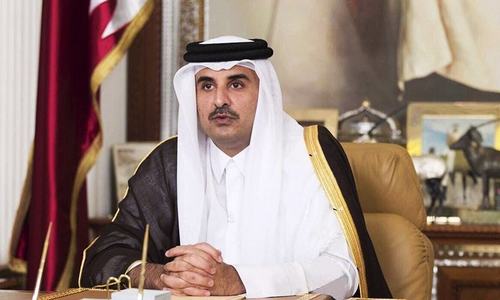RIYADH: Qatar’s emir on Tuesday skipped a Gulf summit billed as a potential “reconciliation conference”, but leaders’ calls for integration provided more signs of a thaw between Doha and regional power Saudi Arabia.
In a sign of the changing mood, the Doha delegation received a warm welcome in Riyadh, with Saudi Arabia’s King Salman and the Qatari prime minister exchanging smiles and pleasantries.
“The people of Qatar, welcome, to your second country,” said the commentator on Saudi state television, in a friendly greeting.
Saudi Arabia, the United Arab Emirates, Bahrain and Egypt cut all diplomatic and transport ties with Qatar in June 2017, translating into a blockade.
The four nations accused Doha of backing radical Islamists, including the Muslim Brotherhood, and seeking closer ties with Saudi arch rival Tehran — allegations Qatar vehemently denies.
The emir, Sheikh Tamim bin Hamad Al-Thani, sent Prime Minister Abdullah bin Nasser bin Khalifa Al-Thani in his place to the annual summit of the Gulf Cooperation Council.
In his speech, King Salman did not address the Qatar dispute directly but called for Gulf unity in the face of threats including “aggressive acts” by Iran.
GCC secretary general Abdullatif Al-Zayani also called on Gulf nations to remain “integrated and intertwined”, stressing the need for “cohesion”.
Hopes for reconciliation have been raised by indications of a detente between Qatar and its former allies, despite Doha’s refusal to meet 13 key demands made by the Riyadh-led bloc, including shutting down Al Jazeera, downgrading ties with Iran and closing a Turkish military base on its territory.
Yet, beyond the bonhomie in Riyadh, the event “falls short of achieving the intended reconciliation between Saudi Arabia and Qatar”, said Gulf analyst Ali Bakeer.
Published in Dawn, December 11th, 2019














































Dear visitor, the comments section is undergoing an overhaul and will return soon.